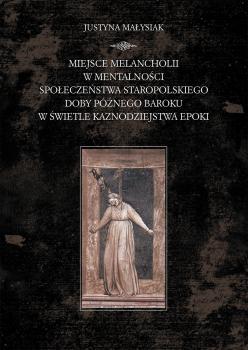Miejsce melancholii w mentalności społeczeństwa staropolskiego doby późnego baroku w świetle kaznodziejstwa epoki
Keywords:
melancholy, sermons, Poland, 17th-18th centuries, religionSynopsis
Melancholy in sermons of 17th–18th centuries in Poland is tightly linked to the notion of sin, which results from the sermons purpose: their goal was to shape the value system of the congregation. Melancholy in the Catholic religious discourse was characterised as a negative emotional state brought about by the loss of faith in God’s mercy. According to preachers, sin was the source of suffering experienced as a consequence of disobedience to God.
Melancholy was an emanation of human independence, a state of unhappiness in an individual who has been losing contact with God. Without God human nature degenerates. The message was that an individual was created perfect and through spiritual growth was supposed to re-attain perfection. However, imperfection inherited with original sin was an obstacle. Human inclination to transgression was a defect to be acknowledged; however, neglecting the thought for salvation was not to be accepted. Neglect was fiercely criticised in preaching and presented uncomplimentarily as stupidity, an easy way into the habit of sin. It triggered in an individual a negative fear and subsequently led to spiritual sadness. Preachers meant in their actions to bring listeners around to the goal of reaching eternal life and to manifest divine grace.
Chapters
-
TABLE OF CONTENTS
-
Wstęp .......... 7
-
Rozdział I. Melancholia i jej związek z grzechem w późnobarokowym dyskursie kaznodziejskim
-
1. Melancholia w interpretacji chrześcijańskiej .......... 31
-
2. Grzech śmiertelny i jego wpływ na duchową kondycję człowieka .......... 56
-
Rozdział II. Melancholia w kanonie grzechów głównych
-
1. Melancholia i sześć grzechów głównych .......... 77
-
2. Melancholia jako lenistwo w służbie Bożej .......... 102
-
Rozdział III. Melancholia jako efekt obaw i konfliktów wewnętrznych człowieka
-
1. O lęku, cierpieniu i rozczarowaniach człowieka .......... 133
-
2. Melancholia jako smutek wynikający z zerwania więzi ze Stwórcą .......... 158
-
3. Obawy eschatologiczne .......... 175
-
Rozdział IV. Środki kaznodziejskie przeciwdziałające melancholii
-
1. Pocieszenie i łaska .......... 207
-
2. Człowiek i jego pytanie „kim jestem?” w przekazie kaznodziejskim .......... 236
-
Zakończenie .......... 265
-
Bibliografia .......... 271
-
Indeks osobowy .......... 315
Downloads
References





